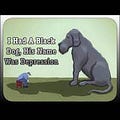Mental Health Practitioners Believe That Using The Colour Black Is Racist
Worrying practices among mental health practitioners
I recently observed a ‘Mental Health First Aid’ workshop. Mental Health First Aiders are a hugely important resource within organisations, providing ad-hoc and voluntary mental health support to colleagues.
I entered the workshop feeling positive, expecting to be surrounded by individuals who prioritise the collective mental wellbeing of society. More than anything, I hoped I would encounter people with the personal resilience necessary to enable them to offer therapeutic support when called upon. Unfortunately, what I witnessed shocked me beyond belief.
During the workshop, the facilitator played a video publicised by the World Health Organisation, entitled ‘I Had a Black Dog, His Name was Depression’. This was originally a book, written by Matthew Johnstone, detailing his longstanding battle with depression, in order to help others also suffering. This seemed like a noble cause and a hugely important resource for mental health practitioners to familiarise themselves with.
When the video ended, the facilitator asked the group for thoughts. Immediately, a member of the group, a young black woman, stood up. She proceeded to shout at the facilitator, claiming that the term ‘black dog’ was “racist”. She said that she was “offended”, that she did not recognise the “validity” of the video and she demanded an “apology” for having to watch it. Within a few moments, a number of other people in the group stood up in agreement and threatened to boycott the entire training session, unless the facilitator apologised. After 30 minutes back and forth, the facilitator acquiesced.
It’s crucial to highlight that there was no racism, explicit or implicit, afoot here. The term ‘black dog’ can be traced back as far as ancient mythology. Dogs have traditionally been associated with death (for example, Cerberus, the 3-headed dog who guards the gates of the underworld) and the colour black has, unsurprisingly, traditionally been associated with darkness. Winston Churchill famously used the phrase when describing his own internal turmoil.
This entire scenario deeply saddened me. Here were people taking offence and forcing another to conform and apologise, without any rational basis whatsoever. These individuals were operating under the assumption that use of the colour black with any negative connotation must automatically be racist. This premise logically cannot be, and it could lead to vast restrictions of our language. I have become increasingly aware of the culture of victimhood that has grown in our society and the dangers of pandering to this, in the form of political correctness, which threatens our very liberties of free speech.
Keep reading with a 7-day free trial
Subscribe to James Esses to keep reading this post and get 7 days of free access to the full post archives.


